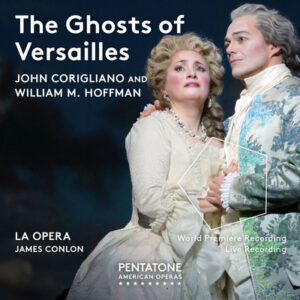Many of my friends and respected colleagues, including the wise and discerning Thomas May (who wrote the enlightening notes that accompany this recording), find this opera not only a great pleasure, but a near-great opera. I was at the world premiere at the Met in 1991, returned for the 2008 revival, and have subsequently watched the DVD from the Met. Now along comes this CD set from Pentatone, who could not have done a better job of catching text from all different parts of the playing area, recording the orchestra and its many strains more clearly and naturally and, overall, offering a spotless aural image of a remarkable series of performances taken live from the stage of the LA Opera.
Having put in my time, I still find the work less than cohesive and less than a pleasure. It is a self-congratulatory kitchen-sink of styles with a libretto that is filled with both irony and pathos—occasionally at the same time—but pushes both ends uncomfortably and confusingly. Librettist William H. Hoffman is given equal billing with composer John Corigliano, and indeed the concept is all of a piece. The central notion is that we are, partially at least, in the afterlife in the Versailles of Louis XVI. Marie Antoinette and Louis roam, and she in particular is obsessed with memories of her own beheading. Men and women come and go and Louis is pretty bored.
Into this mist comes the playwright Beaumarchais who, enamored of the Queen, decides to stop the gloom by presenting an entertainment in which he uses characters from his plays: Figaro, Susanna, the Count and Countess Almaviva. Within the opera Beaumarchais is creating, Figaro and the Count attempt to rescue the Queen from execution. She and the Court are entertained by pratfalls and slapstick from Figaro, a slimy villain named Bégearss, and eventually, a bizarre, unexplained voyage to the home of the Turkish Ambassador, where a lavish entertainment is put on, featuring mock-Eastern music and a band of kazoos.
Beaumarchais eventually enters his own opera and tries to rescue the Queen by taking her diamond necklace and giving it to his characters to sell to get the Queen out of prison. And so the second notion is that creating a fine enough fiction might be able to change history. (But then there will be something to snap us out of it, as when a character is run through with a sword and exclaims “You cannot kill me; I’m already dead.”) At the end, Marie asks Beaumarchais to leave history as it is; she is satisfied living with him in the fictional afterlife. Art wins over history. An interesting concept, but surrounded by, well, a band of kazoos. It giveth and it taketh away and we wondreth how we are supposed to reacteth.
To its credit—notwithstanding the kazoos, which really are there to entertain not the Court, nor to mean anything within the opera Beaumarchais is spontaneously creating, but to tickle the audience in today’s world—the kitchen-sink is filled with interesting cutlery and dishes. Corigliano wittily uses snippets from Mozart’s operas and Rossinian patter songs in the “Beaumarchais” part of the opera and eerie, chilly string glissandos (swooping like a theremin) and post-modernist dissonances that introduce the ghosts. (Let me point out that Britten did this better in his Midsummer Night’s Dream.) Its eclecticism is not its problem; it’s that none of it really touches the heart, and each “bit” undermines the last. After Marie’s aria of sadness, regret, fear, and bitterness early in the opera, the next line is Louis’, who says “My wife was always hard to please.” Parody or pathos? One tires of worrying, especially for two hours and 40 minutes.
Marie Antoinette is sung here by the fine singing actress, Patricia Racette, and she excellently conveys the character’s sense of fear and regret. Her duets with Christopher Maltman, who sings Beaumarchais, are lovely, if wandering, but the sheer sound of Maltman’s voice helps keep our interest. Lucas Meachem also shines as Figaro, even given his opening aria, which really doesn’t sound like Rossini at all but contains tons of words. Guanqun Yu is simply lovely as Countess Rosina (the role sung by Renée Fleming at the premiere)—elegant and refined. The creepy Bégearss has a terrific aria in Act 1, and tenor Robert Brubaker makes a marvelous meal of it. Joshua Guerrero is a fine Count Almaviva, but the role would not show off the best in any tenor. The other roles—and there are literally dozens—are all sung with individual stamps.
James Conlon conducts the soloists and LA Opera forces with absolute clarity and forward propulsion; I suspect that this is what the composer hoped a recording would sound like. I just wish the opera were as ingratiating as the performance.
































